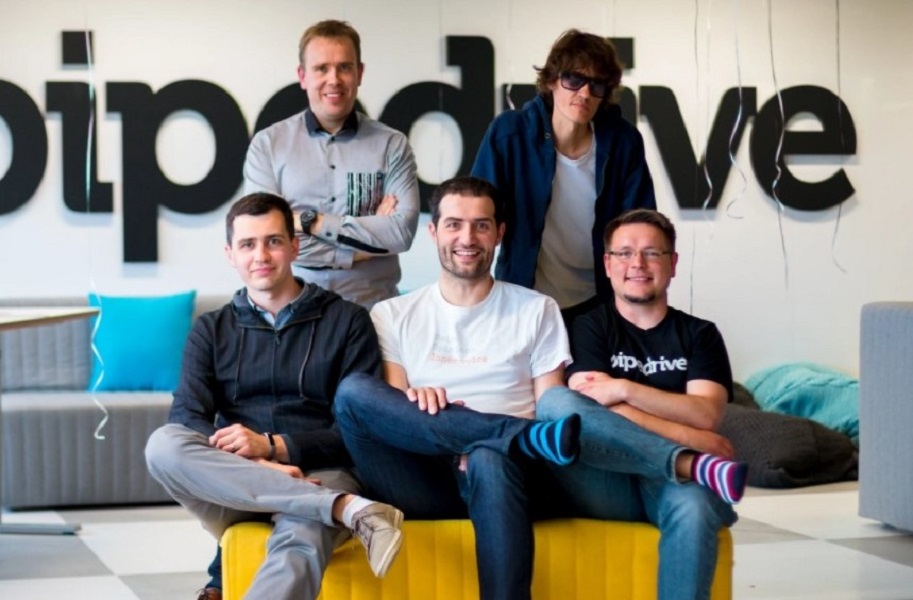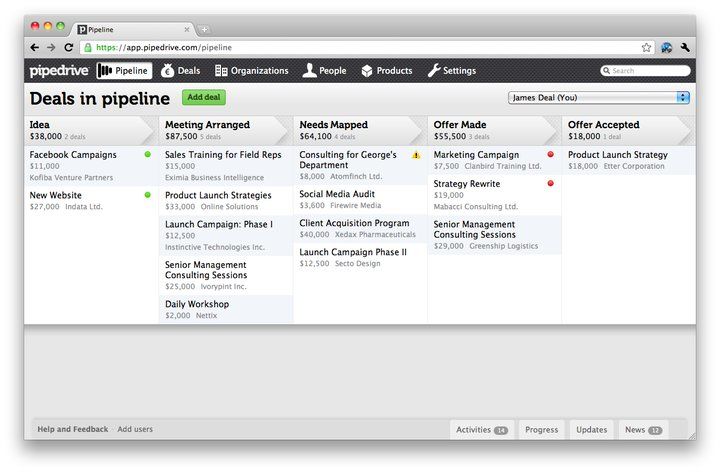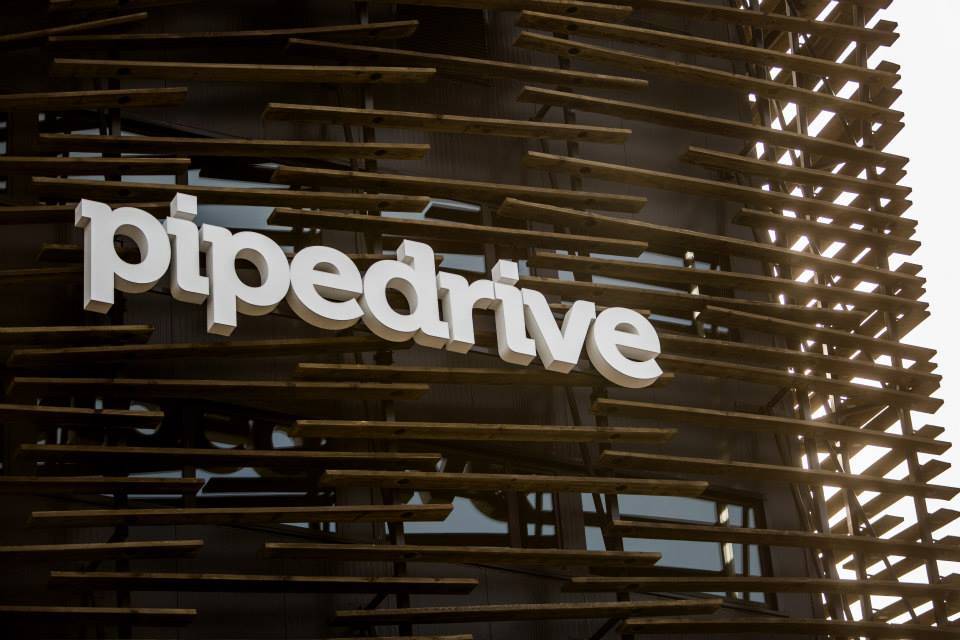The Estonian company, Pipedrive, has developed valued customer management software, which provides wise and practical help to any salesman. Recently, the Silicon Valley technology guru, Vivek Ranadive, and the former star basketball player, Shaquille O’Neal, invested in the company.
This is a lightly edited version of the article first published on Life In Estonia magazine. By Toivo Tänavsuu.
Pipedrive is another example of a successful Estonian start-up which has the potential to conquer the world. Founded in 2010 without much fuss (or advertising), it has managed to stand out in the vast ocean of customer relations management (CRM) tools, where each “drop” claims to be the best in the world.
The facts speak for themselves: the company has almost 10,000 paying customers (and 50,000 users) in over a hundred countries. It makes millions of euros in sales revenue, while claiming that everything – even the product itself – is still in the early phase of development.
One of the founders of Pipedrive, Urmas Purde, says that, typically for many remarkable inventions, the idea for the product grew out of the frustration of the founders themselves. Purde and Timo Rein worked as trainers and salesmen with one of the most famous Estonian training gurus, Peep Vain.
“We had to manage the sales of our own training sessions. We had invested a lot of money in three different CRMs in a row but none of them were suitable for sales people. We asked ourselves, how we could fail with customer management software three times in a row. And we were still keeping an overview of our sales activity as post-its on the wall,” says Purde.
Five years ago, while giving a training session to a start-up company, Purde was sketching some principles of sales pipeline management on a whiteboard when someone from the audience asked: isn’t there software for that? The idea was born and the group of founders – Rein, Purde, Ragnar Sass, Martin Henk and Martin Tajur – came together to develop Pipedrive. The first seed money came from Peep Vain.

Why is Pipedrive such a high-flyer? Whereas most customer management software is meant for supervisors and focuses on providing them with an objective overview of sales activity and the working sales people only tick boxes in each stage, Pipedrive has kind of turned it upside down: it starts from the needs of the sales person who is working on developing customer relations. It aims to provide feedback on the effectiveness of sales activity in the “sales-pipe”.
This new logic quickly won over the first users, who started to use the product’s beta-version in autumn 2010. The following spring the company was established enough to start charging its customers.
Pipedrive helps sales people to maintain focus. Purde explains that sales involve many external impulses and demands: email, meetings, calls and requests from supervisors and colleagues. It is therefore difficult to keep up the pace of work.
“Doesn’t this sound familiar: you work like crazy for a week, making loads of calls, sending tons of emails, but you do not achieve what you set out to do? Pipedrive is here to help. It gives you a clear answer on what you have to do in order to get the best results. What is holding your money up? You maintain the pace and do the right things at the right time,” Purde explains.

Pipedrive has generally received positive media reviews and feedback from clients. Customers include those who have never used customer management software before and have used Excel, notepaper etc, and those who have experience with Salesforce, for example.
Pipedrive can be used to sell anything, from advertising and trucks to journalism. The company targets both small and large customers, and most have found the products without any advertising. They just heard about it from other users. The product sells itself. It may be ironic that Pipedrive, a company selling sales software, has no sales team of its own. Purde says a third of the company’s customers come from Europe, a third from the US and a third from the rest of the world.
In order to use Pipedrive, it does not matter whether a sales company has five or five thousand staff, Purde says. At first the company thought of focussing on bigger customers who made tempting offers to help the company fine-tune the product to their needs. But the founders of Pipedrive stayed true to themselves, believing that this was not the way to reach the masses.
Starting a start-up often provides many lessons. Purde says that they have not just learned a lesson about celebrating success. Estonians are modest in this regard.
When the first customers came on board, they thought this was not a cause to celebrate. Customers began to pay for the service and they still did not think it was worth shouting about. The number of customers grew to ten, then a hundred and then a thousand. It was only with the thousandth client that the founders celebrated in a restaurant. The second big celebration was the opening of the new office in Tallinn.

Pipedrive has now attracted nearly USD3.5 million in investments, including support from two business angels of the Estonian start-up community, former Skype employees Ott Kaukver and Taavet Hinrikus. The company is a graduate of the AngelPad incubator.
Last autumn, without much attention, the former NBA superstar, Shaquille O’Neal, and his multimillionaire business partner, Vivek Ranadivé, invested in Pipedrive. “They were the ones who called us, looking for a partner to serve a couple of customers,” Purde says. “We met and seemed to understand each other. The proposal to invest came from Vivek. We understood that we had a lot to learn from him, especially with regard to building a company like an organisation. If we want everyone to use Pipedrive in the future, we have to integrate with many systems. And this is exactly Vivek’s speciality.”
Whereas the charismatic basketballer O’Neal may be a more familiar name, Ranadivé is no less colourful a character. Growing up in a small village in India, he built up the successful stock-exchange listed IT-services company TIBCO. Ranadivé also “wired up” Wall Street in the 1980s. Since last year, Ranadivé and O’Neal have been the owners of the Sacramento Kings basketball team.
Pipedrive continues to grow and is about to reach puberty. Now it needs to be clever in order to allow the inner life of the company, customer relations and the office side to grow in parallel.
Currently, nearly 40 people work in the two offices of Pipedrive in Tallinn and Silicon Valley.
Purde says: “We are going to reach a 10 million annual revenue run-rate by the end of this year or the beginning of the next. Some smart guys say things get a bit easier as a management team grows with the company. Until then, as is normal for start-ups, we have to deal with all questions fast and at the same time. We have to maintain focus and not get tired.”
This article is published in collaboration with Life In Estonia magazine, the publication of the Estonian Investment Agency.

